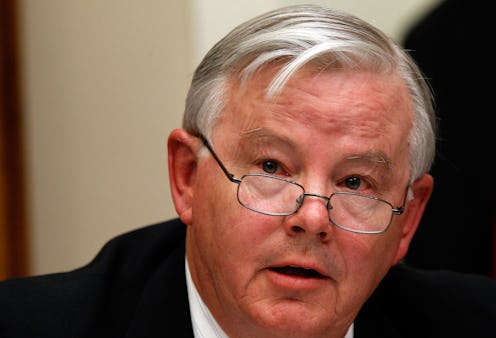News
This Representative's Town Hall Is Unacceptable

Town hall meetings with GOP representatives across the country have been a little testy since the 2016 presidential elections. Many constituents — frustrated with policy recommendations from "out of touch" politicians that they feel don't represent their best interests — have flooded these forums to raise concerns and speak out about controversial legislation. Rarely do politicians talk back to these concerned constituents. Even more rarely do they tell them to "shut up." But last week, a when a Texas representative did both when the Republican told a man to "shut up" about violence against women during his town hall. And that's the one issue that should never be considered controversial.
During the town hall, Texas Rep. Joe Barton was asked by an attendee whether he would work with California Democratic Rep. Jackie Speier on legislation that would protect women from violence.
"Given your voting record opposing legislation protecting women from violence, will you make a commitment to us today — make a promise — that you will reach out to Congresswoman Jackie Speier and work with her to see this bill successfully through Congress?" the attendee asked.
Barton voted against the Violence Against Women Act reauthorization in 2013, a bill that expanded services and protection for survivors of sexual assault and domestic violence. In answering the attendee's question, Barton said that he voted against the bill because violence against women is a state issue, not a federal one.
His response (rightfully) led to many boos and jeers from the audience, with one man shouting, “It’s violence against women. That’s a national issue. That is an issue that impacts everyone everywhere, not only in this country but everywhere.”
Barton wasn't having it.
"You, sir, shut up," Barton said while pointing directly at the man who voiced his concerns.
Barton's outburst is alarming for many reasons. For starters, it's unacceptable for any politician to attempt to silence the concerns of his constituents in such an abrupt way. Town halls are intended to be a platform for open dialogue and debate — even if this debate becomes tense — because it is through this debate that politicians are able to hear the diverse perspectives of everyday voices that may be missing from policy discussions. It is only through this dialogue that inclusive legislation that serves the needs of the people can be created.
But Barton's language is even more alarming because of the content of the discussion that it attempts to shut down. Rape and domestic violence are issues that disproportionately affect millions of women, and they need to be discussed by politicians so that appropriate measures can be taken to create programs and funding that support survivors.
According to the National Coalition Against Domestic Violence, one in every three women has been affected by some form of domestic violence, and women make up 85 percent of all instances of abuse by intimate partners. Unfortunately, these instances are significantly under-reported by survivors, who often feel that they will be stigmatized or simply won't be believed if they report the abuse.
Barton's comments at his town hall meeting send the message that he does not want to hear about gender-based violence, and will shut down conversations before even hearing opposing points of view, whether from survivors or allies.
Barton responded to the backlash he has received by stating that the attendee who spoke out against gender-based violence was being unruly and disruptive, shouting out of turn over others. In a statement to the Huffington Post, Barton said:
All town halls begin with ground rules, which include that you must be recognized in order to speak. These are unscripted live meetings. Over the weekend in Frost, one gentlemen continued to speak over myself and many others who were seeking recognition in orderly fashion. I did, however, return to him for the last question of the meeting and allow him the opportunity to voice his concerns.
Despite this statement, it remains to be seen whether Barton will see this controversy as an opportunity to hear diverse perspectives about approaches to mitigating violence against women, and whether he will collaborate with lawmakers to create legislation that provides resources and services for survivors.